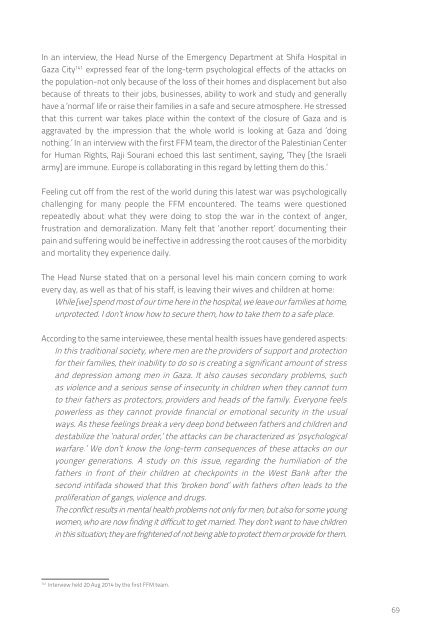HHo0s
HHo0s
HHo0s
Create successful ePaper yourself
Turn your PDF publications into a flip-book with our unique Google optimized e-Paper software.
In an interview, the Head Nurse of the Emergency Department at Shifa Hospital inGaza City 141 expressed fear of the long-term psychological effects of the attacks onthe population-not only because of the loss of their homes and displacement but alsobecause of threats to their jobs, businesses, ability to work and study and generallyhave a ‘normal’ life or raise their families in a safe and secure atmosphere. He stressedthat this current war takes place within the context of the closure of Gaza and isaggravated by the impression that the whole world is looking at Gaza and ‘doingnothing.’ In an interview with the first FFM team, the director of the Palestinian Centerfor Human Rights, Raji Sourani echoed this last sentiment, saying, ‘They [the Israeliarmy] are immune. Europe is collaborating in this regard by letting them do this.’Feeling cut off from the rest of the world during this latest war was psychologicallychallenging for many people the FFM encountered. The teams were questionedrepeatedly about what they were doing to stop the war in the context of anger,frustration and demoralization. Many felt that ‘another report’ documenting theirpain and suffering would be ineffective in addressing the root causes of the morbidityand mortality they experience daily.The Head Nurse stated that on a personal level his main concern coming to workevery day, as well as that of his staff, is leaving their wives and children at home:While [we] spend most of our time here in the hospital, we leave our families at home,unprotected. I don’t know how to secure them, how to take them to a safe place.According to the same interviewee, these mental health issues have gendered aspects:In this traditional society, where men are the providers of support and protectionfor their families, their inability to do so is creating a significant amount of stressand depression among men in Gaza. It also causes secondary problems, suchas violence and a serious sense of insecurity in children when they cannot turnto their fathers as protectors, providers and heads of the family. Everyone feelspowerless as they cannot provide financial or emotional security in the usualways. As these feelings break a very deep bond between fathers and children anddestabilize the ‘natural order,’ the attacks can be characterized as ‘psychologicalwarfare.’ We don’t know the long-term consequences of these attacks on ouryounger generations. A study on this issue, regarding the humiliation of thefathers in front of their children at checkpoints in the West Bank after thesecond intifada showed that this ‘broken bond’ with fathers often leads to theproliferation of gangs, violence and drugs.The conflict results in mental health problems not only for men, but also for some youngwomen, who are now finding it difficult to get married. They don’t want to have childrenin this situation; they are frightened of not being able to protect them or provide for them.141Interview held 20 Aug 2014 by the first FFM team.69


